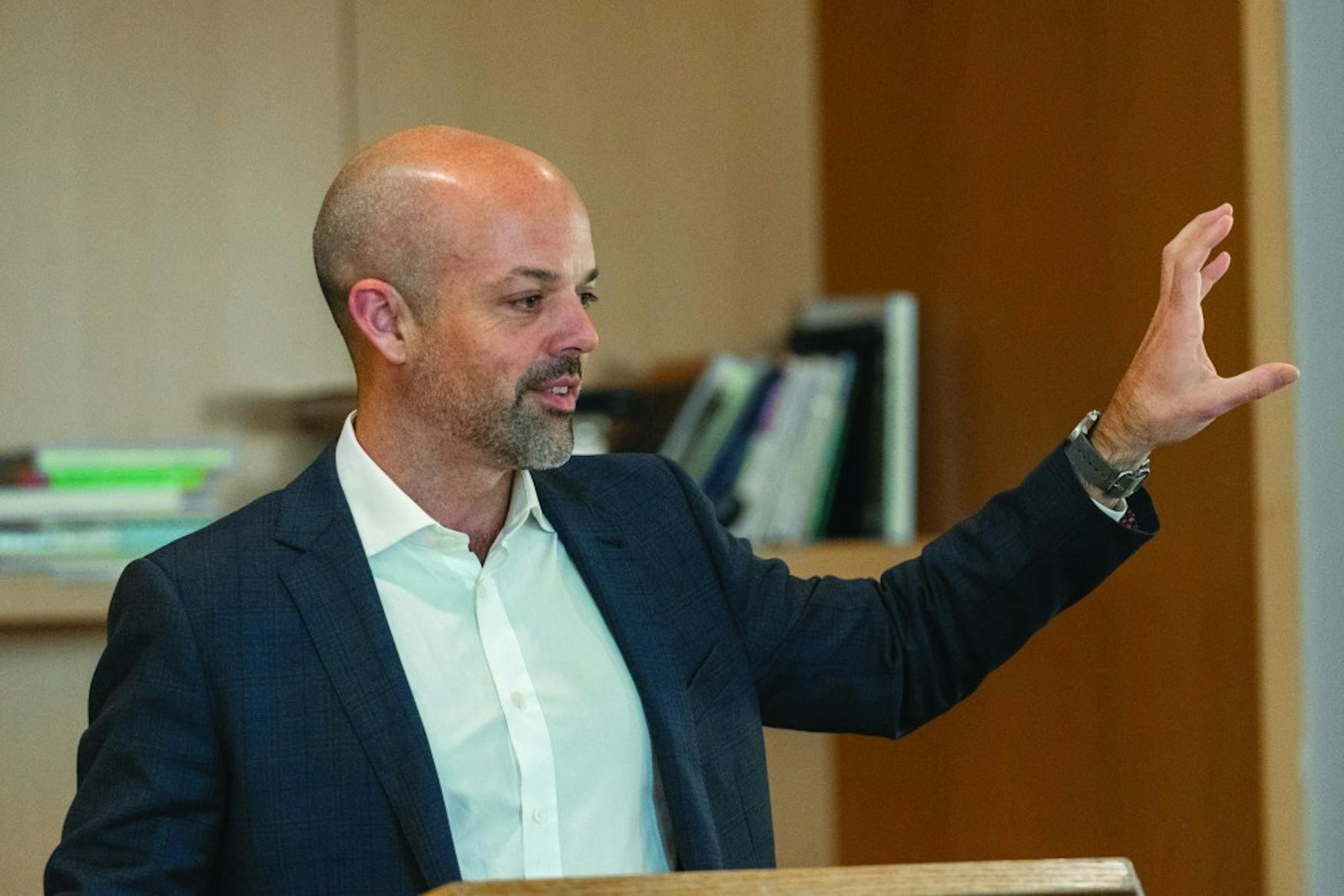Is it time for unity?
State Senator Adam Hinds stressed the importance of bipartisanship
This midterm election season brought forth the rise of diverse candidates and winners: from Massachusetts’ own Ayanna Pressley, the first African-American woman to represent the state in Congress, to the election of Andy Kim, the first Korean-American Democrat in Congress. While the 2018 election cycle had record-breaking numbers of diverse winners, it also was the most expensive, with House candidates alone raising more than $1 billion dollars. Since the 1980s, the increasing role of money in politics is just one of the reasons for our increasingly polarized political climate, according to Massachusetts State Senator Adam Hinds.
Hinds spoke to an intimate group of Brandeis students and faculty on Wednesday in the Mandel Center for the Humanities. The lecture, which was co-sponsored by the International & Global Studies Program and the Department of Politics, was an informal discussion. “We’ve seen that since the 80s, there has been a 555% increase in the amount of money in political campaigns,” Hinds said. “[Candidates] will stick to an extreme position so they can avoid that [PAC] money being spent against them, being primaried, or they want to attract that money. Certainly, you can imagine how this changes the policies that are developed, if not the positions, from a social perspective.”
Another reason politicians are becoming more extreme is because of gerrymandering, according to Hinds. “Gerrymandering has happened for as long as we’ve had this country, but it’s really become more apparent since the 80s and 90s where data is being used to make outcomes more favorable for your party,” he said. The outcome of gerrymandering is that candidates only face significant competition during their primary, motivating them to be more extreme. Hinds mentioned that this leads to “no interest in finding that middle path. At the national level, when there’s a confluence of that, it is a real inhibitor to the process as a whole and getting things done.”
Hinds named gerrymandering and voter suppression as his biggest concerns for both the 2018 elections and the political process as a whole. Regarding the gubernatorial race in Georgia, Hinds said, “it was a close race, but let’s look at who was purged, ID requirements, the number of polling booths in a polling location. It’s all very deliberate and very scary.” However, Hinds mentioned the restoration of felons’ voting rights in Florida a day earlier as a reason to be hopeful.
When one student asked about the specific ramifications of the Democrats’ House victory, Hinds said that among the most important actions that a majority-Democratic House can do is “call the bluff of the Senate side. You can imagine what bills can be filed strategically just to get people on the record. But I’m not expecting a revolution.”
“On one hand, we’ve been watching Donald Trump support states that promote voter suppression. While here, in Massachusetts, we’ve gone the other way. This year we passed automatic voter registration: that’s significant,” Hinds said, touting the state Senate’s actions.
While gerrymandering and campaign donations have essentially been instituted by the government, Hinds pivoted to a non-governmental entity as another reason for the growing division in America: the media. In the 1970s, Americans had access to a limited number of news sources, and the vast majority of news networks were objective and consistent in their reporting. “In the 90s with cable television, we start to see this trend of watching news that caters to your own views,” Hinds said. “This leads to confirmation bias. You start, particularly when it comes to politics, with a view and then you seek to confirm it.”
Even though Hinds’ lecture was mainly focused on the reasons America’s political climate is increasingly divided, he stressed the importance of bipartisanship. “The way to sell it [bipartisanship] is to say to people that the old way isn’t working. Putting a bunch of money in, shifting districts to favor your party, and then getting the politician that will push your policies is not effective if those policies are immediately undone. There’s a need to actually reach across the aisle,” he said.
Near the closing of his lecture, Hinds mentioned the importance of young politicians like recently elected Congresswoman Alexandria Ocasio-Cortez from New York in motivating other young people to be politically involved. Referring to the rise of women seeking public office across the nation, he said, “It’s just amazing to me, and it shows a step in the right direction.”



Please note All comments are eligible for publication in The Justice.